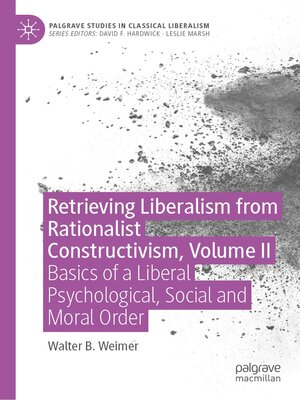Retrieving Liberalism from Rationalist Constructivism, Volume II
ebook ∣ Basics of a Liberal Psychological, Social and Moral Order · Palgrave Studies in Classical Liberalism
By Walter B. Weimer

Sign up to save your library
With an OverDrive account, you can save your favorite libraries for at-a-glance information about availability. Find out more about OverDrive accounts.
Find this title in Libby, the library reading app by OverDrive.



Search for a digital library with this title
Title found at these libraries:
| Loading... |
This second volume, Basics of a Liberal Psychological, Social and Moral Order, overviews developments in the theory of spontaneously ordered complex phenomena, the psychology of inference and expectation, the nature of anticipatory systems in the psychological and economic domains, and the evolution of scientific thought and knowledge. The book applies these insights to the nature of markets and morals, what education should consist of, and the problems of alienation and our existential malaise as we move into an increasingly abstract society. In doing so it also shows the unscientific nature of the rationalist constructivist approach of progressivism, and the disastrous consequences that would arise from following these positions.
The book shows the complex interplay between top-down or directed structures (what Hayek and others have called taxis organizations) and far more complex orders of the social or psychological cosmos in which they are embedded as constituents. It details how the key to the market orders of society depends upon their capacity to impersonally convey information to agents. Markets can serve unknown and unforeseen ends for individuals who do not know or have contact with other market participants. This is a vastly more powerful and productive system than anything that can arise in a tribal or face-to-face organization limited to personal contact, such as the sort proposed by the constructivists. The book will be of interest to academics and scholars in classical liberalism, economics and political philosophy.






